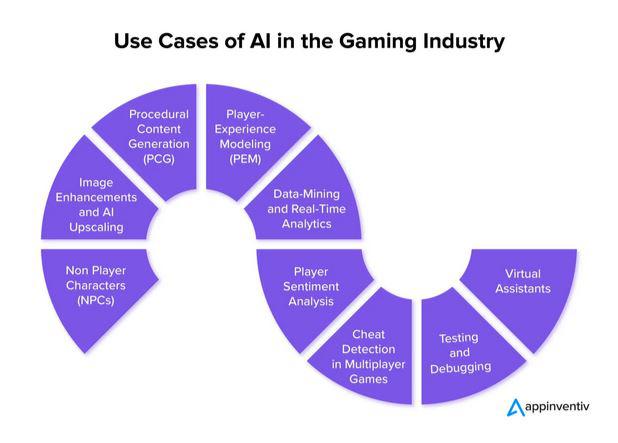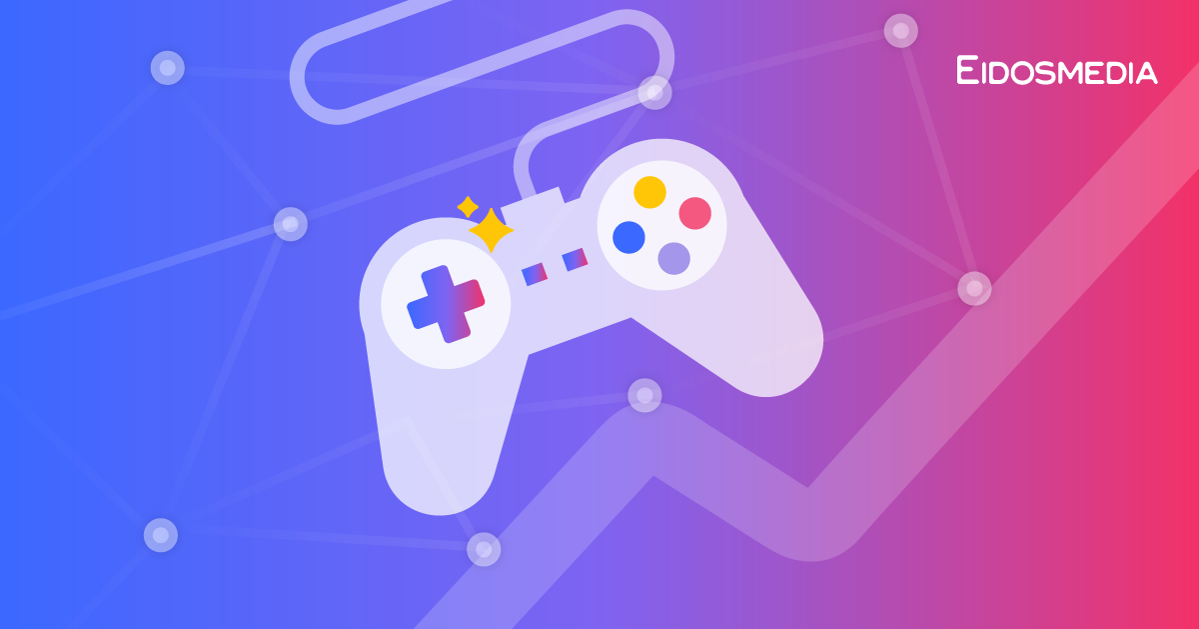How will AI Impact Gaming?
Potential applications of GenAI in the creation of video games are numerous - but so far implementation has been limited, while concerns grow over game quality and possible job cuts.
Video gaming and generative AI look like a perfect fit, with little of the reservation surrounding the arrival of this technology in other sectors. As so often is the case when it comes to generative AI, however, speculation abounds, but there is little concrete detail about what AI tech might contribute to the creation of video games.
Meanwhile, many game developers and performers are worried. Will generative AI take their jobs? Or is this just another fad? We explore the reality of generative AI’s role in the future of video games.

Source: Appinventiv - Gaming in AI
Generative AI’s potential roles in game production
While hardware and software manufacturers across industries have been rushing to incorporate AI into their products, video game developers have been more circumspect. That does not mean they are not thinking about how AI will figure into their future.
From algorithm to AI
Since their earliest invention, video games have used algorithms to control in-game movements. This makes them ripe for AI-innovation, and the possible uses are many. There are, of course, the low-hanging fruit. AI-generated content, scripts, characters, and voices are all options. However, all of these now familiar uses for AI can be taken a step further.
Non-player characters (NPCs) are among the most likely elements to be transformed by AI. Rather than being controlled by limited scripts, AI allows them to react dynamically to player choices. They can even display human-like emotions, have conversations, or even recall past interactions. This creates a more dynamic in-game world, including helping Enemy AI (EAI) characters determine tactics and decision-making. Natural Language Processing (NLP) can enable players to have conversations with NPCs using voice commands.
New levels of personalization
AI can bring the same dynamism to game worlds and other content. Levels and maps can adapt to a player’s choices. This could make games different on every playthrough. Developers call this procedural content and AI can help save them time on generating this content. It can also help them personalize the game for each player and even adjust the difficulty level as players play over and over again.
The list of possibilities is very long, but what works in reality is still being determined.
Slow uptake for AI in gaming
At this year’s Game Developers Conference (GDC), CNET reports, “Nvidia and Ubisoft showed off their dynamically responding nonplayer characters at GDC 2024, but they haven't announced grand plans to integrate them into upcoming games.” Meanwhile, they report that Microsoft has worked with “Inworld AI to develop AI game dialogue and narrative tools.” However, it seems relegated to less sexy uses: Microsoft is reportedly developing an Xbox customer-support chatbot.
In fact, experts are skeptical that generative AI is ready for prime time when it comes to video games. Instead, AI is poised to play more behind-the-scenes roles. For instance, AI bots can help quality assurance (QA) teams hunt for glitches and bugs. In fact, with the ability to work around the clock, it’s entirely possible that bots could replace QA teams.
Time and cost savings
In almost every industry, AI’s first role is to reduce the amount of time people spend on tedious tasks, and that’s no different in the gaming industry. Beyond QA tasks, CNET says Unity sees, “Submitting prompts to generate content could reduce the amount of tedious tasks on developer checklists, make it easier to use complex tools, and eliminate bottlenecks by letting developers iterate on gameplay without programmer support.”
Importantly, using AI to improve workflows can also bring down costs. Andrew Maximov, a gaming industry veteran, told the BBC, "I used to work for PlayStation and the last game that I worked on, just production alone cost us $220m [£176m], and then you double that for marketing, and you are in half a billion dollars for every game that you put out there, which is a bit unsustainable for most companies." In fact, he developed a set of tools to help make video game production more accessible. Maximov’s Promethean AI lets developers craft their own virtual worlds. The AI works hand-in-hand with humans to make their dreams come to fruition, but it still needs human input.
On an industry-wide scale, automating granular tasks frees up developers to take on more creative tasks and improve productivity - but opinion is divided on whether this is an entirely good thing.
Quantity or quality?
There is no doubt that AI has the potential to increase productivity in game production as in every other industry it touches. But the question that is increasingly asked is whether or not increased productivity is always what’s best for the industry.
Commenters on one Financial Times story don’t think so. ProgramCoordinator wrote, “Gaming is not necessarily about quantity, it is about quality, so please let's not have AI leading to more releases per year. Faster does not equal better.” Other commenters agree. “Ten years later: ‘Why are video games these days so generic and uninteresting?’” predicts DCPhaedrus.
Does AI Threaten gaming jobs?
In fact, comments like these might be precisely why development companies have chosen to keep AI in the background. That may bode well for the developers and performers who are worried about their futures in an industry that has already suffered from widespread job cuts. The BBC reports, “Gaming remains profitable, but thousands of workers worldwide have lost their jobs, and successful studios have been shut down over the past two years.” Many are worried that an increased focus on cutting costs and building the bottom line will continue to drive companies to replace people with AI.
The AP reports, “Video game performers say they fear AI could reduce or eliminate job opportunities because the technology could be used to replicate one performance into a number of other movements without their consent. That’s a concern that led the Screen Actors Guild-American Federation of Television and Radio Artists to go on strike in late July.”
New actors looking to break into the industry through smaller background roles may be especially vulnerable as AI steps in. Concept artists are worried that they may end up playing second fiddle as generative AI is asked to produce quick displays but struggles with the details, leaving humans to do the fine-tuning.
Will quality win over quantity?
Hardcore gamers want games with top-notch stories and characters. They frequently wait years for their favorite games to come out with the next big installment and are happy to do so as long as the reality lives up to the hype.
AI is poised to transform gaming, but if developers stay committed to creating great content and not just churning out one game after another, its role may be limited to improving routine, low-creativity processes. While jobs may be at risk, they may not ultimately be the highest-profile jobs.

